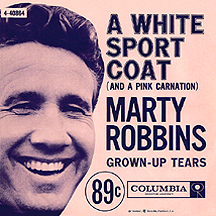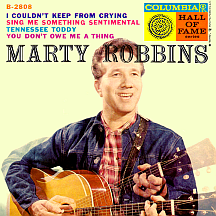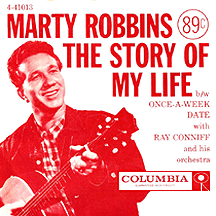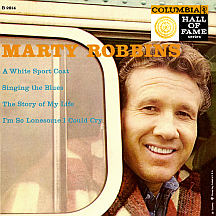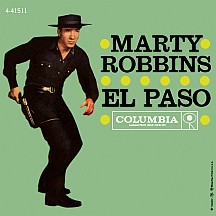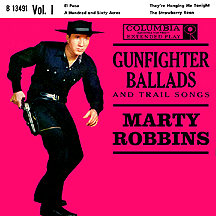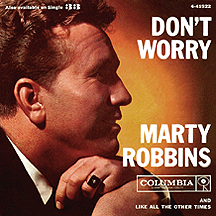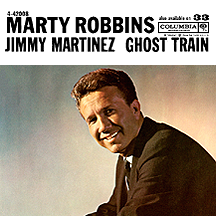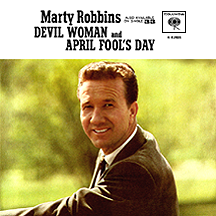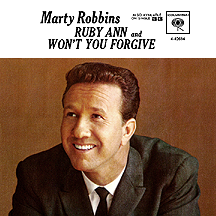MARTY ROBBINS
There have been many powerful country singers through the years, and Marty Robbins may very well be the best of them all. That opinion depends, of course, on personal preference; if a strictly traditional or more consistent, conventional type of singing is what you demand, he may not be your man. I've always preferred variety in my music, and on that count he delivers like few others. During his three decades of recording, he ventured beyond country and into pop standards, rhythm and blues, rock and roll, international rhythms, folk music, teenage romance, Hawaiian music (a personal favorite of his) and was perhaps most successful with a series of songs that fall under the heading "Tales of the Old West."
Twins Martin and Mamie were born to the Robinson family in 1925. The early years in Glendale, Arizona (just up the road from Phoenix), were a struggle, made more difficult by an abusive, hard drinking father. One comfort he had was listening to his grandfather, former Texas Ranger Bob Heckle, tell colorful stories of bygone western days. Along the way he learned to play guitar and piano. By the time his parents divorced in 1937, Martin had entered a rebellious phase; he dropped out of high school and joined the Navy at age 17, right in the thick of World War II.
After the war, he began following his dreams of being a musician, calling himself Jack Robinson for a short time in an attempt to hide such goings-on from his disapproving mother. A radio stint in the late 1940s on the early morning Chuck Wagon Time, as Marty Robbins, led to his own 15 minute TV show on KPHO, Channel 5 in Phoenix, which had signed on in December 1949. Country Caravan gave him exposure and drew popular country stars as guests when they were in the area; "Little" Jimmy Dickens, in particular, was impressed by Marty's talent and recommended the young singer to his label, Columbia.
Once a contract was signed, Marty's rebellious nature emerged; he refused the songs suggested by label brass for his first session in November 1951. He brought in a couple of his buddies from Phoenix, guitarist Floyd Lanning and steel guitarist James Farmer, for that first go-around in Los Angeles, which also featured session guitarist and country star Johnny Bond. The first single, "Tomorrow You'll Be Gone," was a bit sedate and more than a little reminscent of what Eddy Arnold was doing at the time. Neither it nor the follow-up caught on. Marty insisted on writing his material and somehow, in spite of early failures, was allowed to do so; a June 1952 session in Dallas, Texas achieved better results. His wife of four years at the time, Marizona Baldwin (he'd met and wed her back in Glendale), wasn't pleased with his choice of vocation, at least not at first. "I'll Go On Alone" verbalized his feelings (but they didn't split up!) and this third single became his first hit, easily making the country top ten in early 1953.
He was off and running. Having a hit song helped him land a spot on Nashville's Grand Ole Opry. He enjoyed it so much that he moved his entire family (wife and two young children) to Nashville and became a regular on the Saturday broadcast. Marty's faith in his own songwriting abilities paid off when Fred Rose signed him to a contract with Acuff-Rose publishers. Working with Columbia producer Don Law, he released mostly ballads (perhaps pressured to do so) and the label gave him a nickname he disliked from the start, "Mister Teardop." This bit of stereotyping coupled with lagging record sales over the next couple of years prompted him to further defy the powers that be and follow his heart. He became somehat unpredictable in song choices, often baffling label brass but with the full support of Law.
When Elvis Presley released his take on blues legend Arthur "Big Boy" Crudup's "That's All Right" as his first single in 1954, it was mildly popular in Memphis and several other cities but didn't catch on outside the south. Marty saw in the song what many others didn't, and with his own compositions languishing at that time, did his own recording using Presley's arrangement, adding fiddles to make it more accessible to a country audience. It was Marty who had the national hit in early 1955, his first in two years to reach the country top ten; Elvis would have to wait just a little longer for his first hit. Rock and roll had made a big splash by summer, with Chuck Berry's "Maybellene" crossing the boundaries of R&B and pop; Robbins brought the song to the country crowd in the fall. Releasing cover versions hadn't been the plan, but in doing so he put himself back in the spotlight. He then began focusing on making a mainstream pop breakthough, but it wasn't that easy to pull off.
"Singing the Blues," written by Nashville songwriter Melvin Endsley, was the perfect vehicle for Marty Robbins. It spent three full months at number one on the country charts from November 1956 through January '57 and made a respectable showing in the top 40 of the pop charts but was overshadowed in the larger scheme of things by Guy Mitchell's pop cover. Seems Columbia head Mitch Miller had gotten Mitchell into the studio with Ray Conniff as arranger as soon as he heard the Robbins original. Guy's recording dominated the music charts in late '56 and well into '57. "Knee Deep in the Blues," also written by Endsley, again came out first by Marty, but this time Mitch and Mitchell successfully cut him off at the pass, getting on the radio and onto the charts first, while "Singing" was still on top. Skillfully positioning one version of each song against the other, Columbia had successfully reached two large groups of record buyers with Endsley's songs.
Marty, not exactly overjoyed at his record company's tactics, tried a new approach to reach the pop audience, a segment of the population elusive to many country acts (most of whom couldn't have cared less about reaching them). He devised his own allegory on romantic growing pains, set squarely in a teenage context. "A White Sport Coat (And a Pink Carnation)" had him '...all dressed up for the dance' but '...all alone in romance.' For this one, he went straight to Mitch and did the session with Conniff arranging and Guy Mitchell's backup crew in the studio. A brilliant slice of the mid-'50s teenage experience, the song connected with young and old, pop and country fans. It went to number one country in May 1957 and reached number two on the pop charts in June (held back by Pat Boone's own timely teenage refrain, "Love Letters in the Sand").
About the time he was pulling his musical crossover coup, the opportunity for Marty to do a little film acting came up. The Badge of Marshal Brennan, not coincidentally a western, featured him in a supporting role, the first of several sidelines into acting over the coming years. His next single, at the end of '57, was another country chart-topper, "The Story of My Life," the first A side hit for the songwriting team of Hal David and Burt Bacharach after they'd broken the million seller barrier earlier in the year with "Warm and Tender," a Johnny Mathis B side. Sticking with the pop/country crossover formula, he also handed up-and-coming songwriter Barry DeVorzon his first hit (with cowriter Al Allen), "Just Married," in spring '58. Marty composed "She Was Only Seventeen," targeting teenage emotions once again before going down a new path, or I should say trail, that succeeded in spreading his music to the widest possible audience.
"The Hanging Tree," from the film of the same title starring Gary Cooper, was the first of Marty's musical Old West narratives and inspired an entire album titled Gunfighter Ballads and Trail Songs. Never before had the concept been taken to such lengths; Robbins had inadvertently carved out a niche others couldn't compete with. "El Paso" was the song that put him over the top. Running more than four and a half minutes, it revealed an entire western scenario, telling of his love for the 'wicked Feleena' and the consequences of falling for a woman prone to flirting with a 'handsome young stranger' he challenges and guns down. Mitch Miller was hesitant to release the overlong song (by 1959 standards) but it went out unedited and caused a sensation, reaching number one on the country charts late in December and pop charts early in January '60, the biggest of his career. He had to wait more than a year, but at the Grammy Awards presentation in April '61 he walked away with the trophy for Best Country and Western Performance against formidable competitors (Johnny Horton, Ferlin Husky, Hank Locklin and Jim Reeves, all of whom scored number one hits with their nominated recordings).
More epic western songs followed in '60 and '61: "Big Iron," "Five Brothers," "Ballad of the Alamo" and "Jimmy Martinez" (telling the Alamo tale from the point of view of the opposition), interspersed with conventional ballads like the string-intensive "Is There Any Chance" and "I Told the Brook," pop hits that bypassed the country charts altogether. Robbins and Don Law were careful not to overdo the "Old West" angle, riding into new territory when they felt the time was right. "Don't Worry" (another number one country and top ten pop hit in 1961) is a country-blues gem that accidentally created a new, and later often-used, technique. Grady Martin's six-string bass on the track came out distorted due to a faulty channel on the mixing board. Marty and Don liked what they heard and released it as recorded while experimenting with ways to recreate the unusual effect. It eventually became the guitar technique known as "fuzz tone."
Marty's songwriting was at its peak as he cranked out hit after hit, including the late '62 smash "Devil Woman," another country chart-topper. He hit number one again in 1963 with Rashima Bellamy's "Ruby Ann," then in '64 with his own "Begging to You." The next country number one, "Ribbon of Darkness" in 1965, became the first major hit in the U.S. for Ontario, Canada songwriter Gordon Lightfoot, who enjoyed his own string of hits in the '70s. Fascinated by NASCAR racing, Marty began hitting the track himself and raced professionally for the first time in 1966, continuing for many years. He had at least one serious accident but came back for more as soon as his injuries healed. He finished solidly in many NASCAR Sprint Cup races throughout his lifetime and competed in the 1972 Grand National East Series.
Late '60s highlights include "Tonight Carmen" in 1967 and Herbert Wilson's "I Walk Alone," his bluesiest number yet, in '68. In addition, Robbins wrote "You Gave Me a Mountain," a late-career hit for former Columbia labelmate Frankie Laine in 1969. That same year, Marty began having chest pains and was hospitalized with three blocked arteries in his heart. He had a successful bypass surgery, still an experimental procedure at the time. While in the hospital, Marizona traveled some 50 miles round trip each day to bring him home-cooked meals (far preferable to hospital food). The marriage, more than two decades strong, inspired him to write "My Woman, My Woman, My Wife," a 1970 hit that won him his second Grammy, as a writer this time, in the category of Best Country Song.
Doctors recommended Robbins take it much easier in the future - advice he ignored. He went back to recording and performing live, including regular Opry appearances, and resumed his second career as a race car driver, with the same gusto as before. Moving to Decca Records in 1972 (the label changed to MCA soon after) he was moderately successful, but it was his return to Columbia that reignited his career. He kicked things off with "El Paso City," fondly reminiscing about the original classic song in the lyrics. In June 1976 it became his first number one country hit in six years. "Among My Souvenirs" followed it to the top, on his way to a career total of more than 90 charted singles, two dozen of them pop hits.
Before his passing, he had a small role in Honkytonk Man, directed by and starring Clint Eastwood. Regrettably, he wasn't around to see its release. On December 2, 1982, after a show in Cincinnati the night before, he suffered chest pains at his home in Brentwood, a Nashville suburb. Emergency surgery couldn't prevent the inevitable outcome. Marty Robbins only made it to age 57, but he left such an expanse of recordings, in widely diverse styles and subject matter, to ensure listeners would be indefinitely and thrillingly entertained.
NOTABLE SINGLES:
- I'll Go On Alone - 1952
- I Couldn't Keep From Crying - 1953
- Pretty Words - 1954
- That's All Right - 1955
- Maybellene - 1955
- Singing the Blues - 1956
- Knee Deep in the Blues - 1957
- A White Sport Coat (And a Pink Carnation) - 1957
- Where D'ja Go? - 1957
by Lee Emerson and Marty Robbins - Please Don't Blame Me /
Teen-Age Dream - 1957 - The Story of My Life - 1957
- Just Married /
Stairway of Love - 1958 - She Was Only Seventeen (He Was One Year More) - 1958
- Ain't I the Lucky One - 1958
- The Hanging Tree - 1959
- Cap and Gown - 1959
- El Paso - 1960
- Big Iron - 1960
- Is There Any Chance - 1960
- Five Brothers - 1960
- Ballad of the Alamo - 1960
- Don't Worry /
Like All the Other Times - 1961 - Jimmy Martinez - 1961
- It's Your World - 1961
- I Told the Brook /
Sometimes I'm Tempted - 1962 - Love Can't Wait - 1962
- Devil Woman - 1962
- Ruby Ann - 1962
- Cigarettes and Coffee Blues - 1963
- Not So Long Ago - 1963
- Begging to You - 1963
- Girl From Spanish Town - 1964
- The Cowboy in the Continental Suit - 1964
- One of These Days - 1964
- Ribbon of Darkness - 1965
- The Shoe Goes on the Other Foot Tonight - 1966
- Tonight Carmen - 1967
- Gardenias in Her Hair - 1967
- Love is in the Air - 1968
- I Walk Alone - 1968
- It's a Sin - 1969
- I Can't Say Goodbye - 1969
- Camelia - 1969
- My Woman, My Woman, My Wife - 1970
- Jolie Girl - 1970
- Padre - 1971
- The Chair - 1971
- The Best Part of Living - 1972
- El Paso City - 1976
- Among My Souvenirs - 1976
- I Don't Know Why (I Just Do) - 1977


